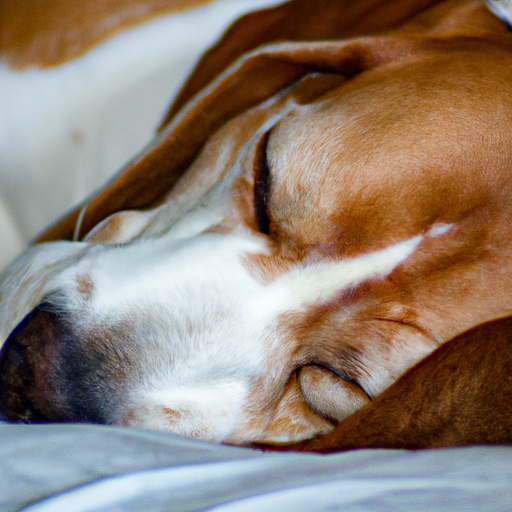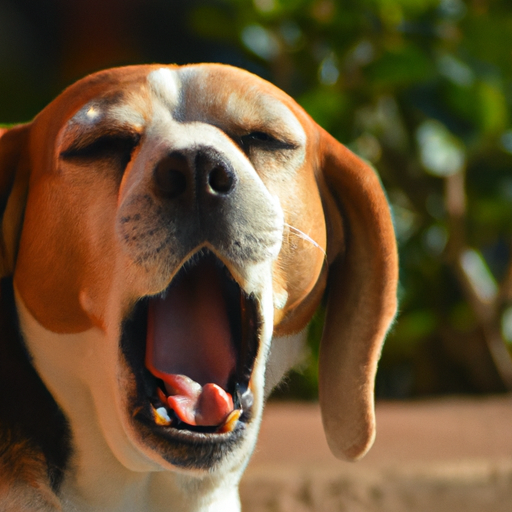This blog post explores the sleep patterns of beagles, a beloved breed of dogs. It delves into the factors that influence their sleep duration, the importance of sleep for their health and well-being, and offers advice on how to ensure your beagle is getting enough rest.
Understanding Beagle Sleep Requirements: How Much Do They Really Need?
Beagles are known for their playful and energetic nature, but like any other dog, they also require sufficient sleep to stay healthy and happy. How Long Do Beagles Sleep? Understanding their sleep requirements is essential for providing them with the rest they need.
- Average Sleep Duration:
On average, beagles sleep for about 12 to 14 hours a day. This is slightly higher than the sleep needs of some other dog breeds. However, it is important to note that individual beagles may have slightly different sleep patterns and preferences. Some may sleep more, while others may sleep less. - Age and Activity Level:
The amount of sleep a beagle needs can vary based on their age and activity level. Puppies and younger beagles may require more sleep as they are growing and developing. Additionally, beagles that engage in regular physical activity, such as long walks or play sessions, may need more rest to recover and recharge. - Quality of sleep:
While the duration of sleep is important, the quality of sleep is equally crucial. Beagles, like humans, need uninterrupted sleep to enter deep sleep phases, which are essential for physical and mental restoration. Providing a comfortable and quiet sleeping environment, free from distractions or disruptions, can help ensure that your beagle gets the restful sleep they need.

Factors Influencing Beagle Sleep: Is Your Beagle Getting Enough Rest?
There are several factors that can influence the quality and duration of your beagle’s sleep. By understanding these factors, you can ensure that your furry friend is getting enough rest:
- Health Conditions:
Beagles, like any other breed, may suffer from certain health conditions that can affect their sleep. Conditions such as arthritis, allergies, or respiratory problems can cause discomfort and disrupt their sleep patterns. If you notice any changes in your beagle’s sleep behavior, it is important to consult with a veterinarian to rule out any underlying health issues. - Environmental Factors:
The environment in which your beagle sleeps can greatly impact their sleep quality. Factors such as temperature, noise levels, and lighting can all influence how well your beagle can relax and fall asleep. Providing a quiet and comfortable sleeping area, away from disturbances, can contribute to a more peaceful sleep for your beagle. - Anxiety and Stress:
Beagles are social animals and can experience separation anxiety or stress when left alone for extended periods. This can lead to restless sleep or even insomnia. It’s important to address any anxiety or stress your beagle may be experiencing and provide them with appropriate outlets for their energy, such as interactive toys or companionship. - Sleep Routine:
Establishing a consistent sleep routine can greatly benefit your beagle’s sleep patterns. Dogs are creatures of habit and thrive on predictability. By following a regular schedule for feeding, exercise, and bedtime, you can help regulate your beagle’s internal clock and promote better sleep habits.

A beagle in deep sleep illustrates the typical sleeping position of the breed.
“Sleep is the best meditation.” – Dalai Lama: The Importance of Sleep for Beagles
Sleep plays a crucial role in the overall health and well-being of beagles. Just like humans, beagles need adequate sleep to function properly both physically and mentally. Sleep is a time for the body to repair and rejuvenate itself, and this holds for beagles as well.
During sleep, beagles’ bodies undergo various restorative processes. This includes the release of growth hormones, which aids in muscle repair and development. Additionally, their immune systems are strengthened during sleep, helping them fight off infections and diseases more effectively.
Sleep also plays a vital role in cognitive function for beagles. It is during sleep that their brains process and consolidate information gathered throughout the day. This is especially important for training and learning new commands or behaviors. Without sufficient sleep, beagles may struggle with memory retention and cognitive tasks.
Furthermore, sleep is essential for regulating a beagle’s mood and emotional well-being. Lack of sleep can lead to irritability, anxiety, and even depression in beagles. Adequate rest allows their brains to reset and recharge, promoting a more balanced and stable temperament.

A beagle yawning, indicating its need for sleep.
Creating a Conducive Environment for Rest: How Can You Help Your Beagle Sleep Better?
Providing a comfortable and calming environment for your beagle to sleep in is essential for ensuring they get the rest they need. Consider the following tips to help create a conducive sleeping environment for your furry friend:
- Design a Cozy Sleeping Space:
Beagles appreciate having their own designated sleeping area. Choose a comfortable bed or blanket specifically for your beagle, ensuring it is the right size for them to stretch out and relax. Place the bed in a quiet and low-traffic area of your home, away from any distractions or loud noises. - Regulate the Temperature:
Beagles are sensitive to extreme temperatures, so it’s important to provide a suitable climate for them to sleep in. Ensure the sleeping area is not too hot or too cold. During colder months, consider using a dog bed with added insulation or provide a warm blanket. In warmer months, ensure there is proper ventilation or use a cooling pad to keep your beagle comfortable. - Establish a Consistent Sleep Routine:
Dogs thrive on routine, and establishing a regular sleep schedule can help your beagle settle into a consistent sleep pattern. Set specific times for bedtime and wake-up, ensuring they align with your beagle’s natural sleep-wake cycles. Consistency will signal to your beagle that it’s time to wind down and prepare for sleep.
Additionally, engaging in calming activities before bedtime can help your beagle relax. Taking them for a leisurely walk or engaging in a gentle play session can help release any excess energy and promote a more restful sleep. Avoid stimulating activities, such as vigorous play or feeding close to bedtime, as this can disrupt their sleep patterns.
How long do Beagle puppies sleep?
Beagle puppies, like most young dogs, tend to sleep a lot. On average, a beagle puppy can sleep anywhere from 16 to 20 hours per day. Puppies, in general, require more sleep than adult dogs because their bodies are rapidly growing and developing.
During their waking hours, beagle puppies are typically full of energy and curiosity. They engage in play, exploration, and learning experiences that help them develop both physically and mentally. As they grow older, their sleep patterns may gradually start to align more closely with those of adult dogs, with slightly less sleep and more active periods.
It’s important to provide a comfortable and safe sleeping environment for your beagle puppy. Make sure they have a cozy bed or designated sleeping area where they can rest undisturbed. As your puppy matures, you’ll also need to establish a routine that includes playtime, training, and socialization to help them become well-adjusted adult dogs. If you have any concerns about your beagle puppy’s sleep patterns or behavior, it’s a good idea to consult with a veterinarian for guidance.

Do Beagles like to sleep with you?
Beagles generally like to cuddle and sleep with their owners. They are pack animals and have an instinct to sleep together. Beagles also enjoy getting under the covers of the bed and often sleep curled up on the couch. Letting your Beagle sleep next to you can create a strong bond between you and your dog. It can also be beneficial to your sleep.
Why do Beagles don’t sleep at night?
Certain juvenile Beagles may be awake during the nighttime due to teething, which can lead to significant discomfort. To alleviate this, offer your Beagle a chewable toy to provide relief for their teething discomfort. Place one of these toys in their sleeping area, allowing them to ease into slumber while minimizing any discomfort caused by teething.
Conclusion
How Long Do Beagles Sleep? The sleeping habits of beagles are influenced by a variety of factors, including their age, health, and lifestyle. Ensuring that your beagle gets enough quality sleep is crucial for their health and happiness. Paying attention to their sleeping patterns and creating a conducive environment for rest can significantly enhance their quality of life.


Very helpful. I thought my one-year-old beagle, Liberty, was sleeping too much, but seems she’s right on schedule. Thank you!